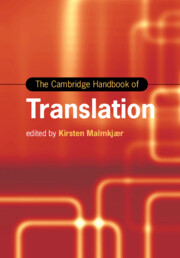Book contents
- The Cambridge Handbook of Translation
- Cambridge Handbooks in Language and Linguistics
- The Cambridge Handbook of Translation
- Copyright page
- Dedication
- Contents
- Figures
- Tables
- Contributors
- Acknowledgements
- Introduction
- Part I The Nature of Translation
- Part II Translation in Society
- 6 Translation and Translanguaging in (Post)multilingual Societies
- 7 Less Translated Languages
- 8 The Translation Professions
- 9 Translation Studies and Public Policy
- 10 Translator Associations and Networks
- Part III Translation in Company
- Part IV Translation in Practice: Factual Genres
- Part V Translation in Practice: Arts
- Part VI Translation in History
- Index
- References
10 - Translator Associations and Networks
from Part II - Translation in Society
Published online by Cambridge University Press: 10 March 2022
- The Cambridge Handbook of Translation
- Cambridge Handbooks in Language and Linguistics
- The Cambridge Handbook of Translation
- Copyright page
- Dedication
- Contents
- Figures
- Tables
- Contributors
- Acknowledgements
- Introduction
- Part I The Nature of Translation
- Part II Translation in Society
- 6 Translation and Translanguaging in (Post)multilingual Societies
- 7 Less Translated Languages
- 8 The Translation Professions
- 9 Translation Studies and Public Policy
- 10 Translator Associations and Networks
- Part III Translation in Company
- Part IV Translation in Practice: Factual Genres
- Part V Translation in Practice: Arts
- Part VI Translation in History
- Index
- References
Summary
Chapter 10 addresses the differences between translator associations and networks. It divides these into four categories – profession-oriented, practice-oriented, education-oriented and research-oriented – and presents examples of each type of grouping. It examines the activities that translator associations and networks typically engage in, focusing in particular on advocacy efforts, training and certification, and social and professional networking. The chapter also introduces the codes of ethics and codes of practice that guide translation professionals.
- Type
- Chapter
- Information
- The Cambridge Handbook of Translation , pp. 198 - 214Publisher: Cambridge University PressPrint publication year: 2022

